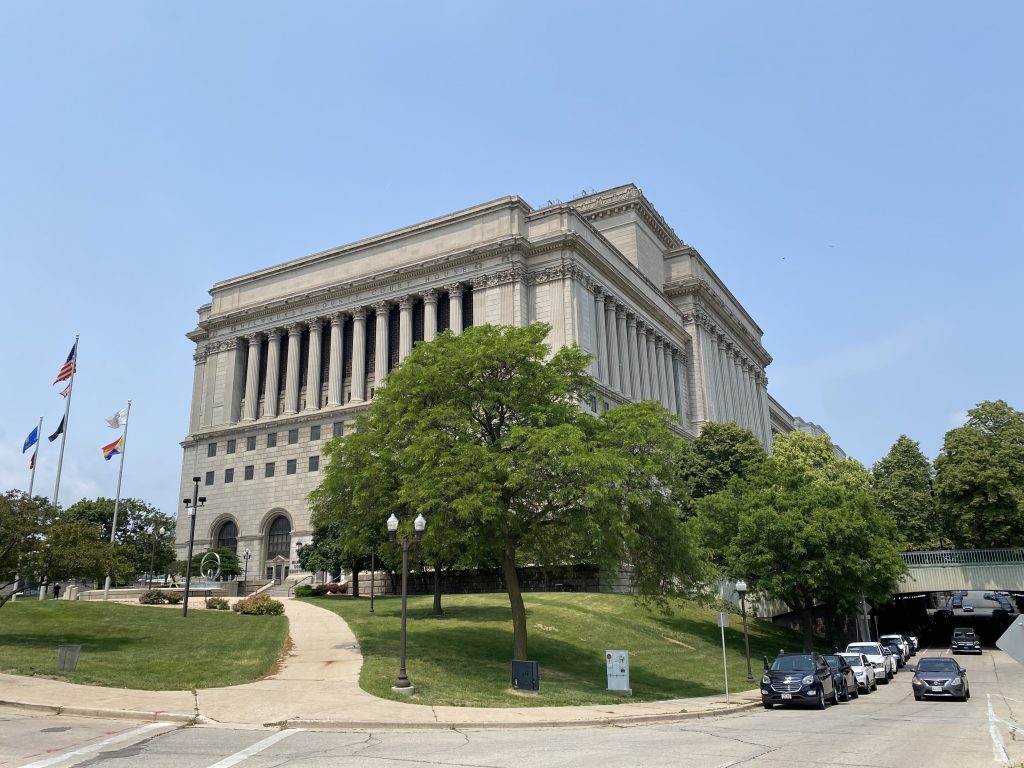City, County Will Partner To Pursue Climate Action Grants
County board resolution urges greater collaboration between the governments on climate projects.

Milwaukee County Courthouse. Photo by Graham Kilmer.
Milwaukee County and the City of Milwaukee are once again collaborating on climate-related projects.
A new resolution unanimously approved by the board’s Committee on Finance Thursday requests that county officials work with the City of Milwaukee and its Environmental Collaboration Office (ECO) to go after grant funding for projects that will reduce greenhouse gas emissions.
The two local governments previously partnered on the City-County Task Force on Climate and Economic Equity. The task force worked for three years and developed the Milwaukee Climate and Equity Plan, which includes proposals designed to help the community reduce greenhouse gas emissions by 45% from emission levels in 2005.
Stuart Carron, director of facilities management for the county, said his office has already been collaborating with the city on both the CPRG application and also “landmark legislation recently on the building energy efficiency and benchmarking ordinance.”
The county is facing a series of budget deficits over the coming years, according to fiscal projections. “So I feel like it’s our responsibility, to leave no stones unturned to work with as many partners as possible in pursuing funding,” said Sup. Anne O’Connor, who sponsored the resolution.
The 2022 federal Inflation Reduction Act created a $5 billion pool of money called the Climate Pollution Reduction Grants (CPRG) program. It set aside $250 million for local municipalities to develop plans for a second $4.5 billion round of implementation funding.
The city applied for CPRG implementation funding, but the U.S. Environmental Protection Agency (EPA) announced the grant winners this month and Milwaukee did not receive funding. The Southeastern Wisconsin Regional Planning Commission (SEWRPC) did recieve a CPRG grant to develop a climate action plan, which will inform future updates to the regional Vision 2050 plan, according to SEWRPC Deputy Director Ben McKay.
Like most federal grant programs, the CPRG grants are competitive, and regional collaboration can help applications be successful, said Erick Shambarger, director of environmental sustainability for the city.
“And so we have been making a full court press to implement the Inflation Reduction Act — that’s the massive climate bill passed by the federal government,” Shambarger said. “And so that’s where the money is to implement the climate plan for the most part.”
Since 2021, the county has also been engaged in a multi-year planning effort charting a long-term strategy for the government to achieve zero carbon emissions by 2050 and a 45% reduction by 2030. Earlier this year, the county board also approved a new rubric to help policymakers evaluate infrastructure projects by their climate impact when deciding what to fund in the annual budget.
“We’ve got a lot of activities going on in this particular area,” Carron said.
The city approved its own climate and equity plan in 2023, a result of the joint task force, and recently approved a solar power partnership with We Energies that will allow it to receive 25% of its energy by 2025, meeting an earlier target.
If you think stories like this are important, become a member of Urban Milwaukee and help support real, independent journalism. Plus you get some cool added benefits.
MKE County
-
Fellow Judge Testifies in Dugan Case
 Dec 16th, 2025 by Graham Kilmer
Dec 16th, 2025 by Graham Kilmer
-
Key Questions in Dugan Trial Take Shape on First Day
 Dec 15th, 2025 by Graham Kilmer
Dec 15th, 2025 by Graham Kilmer
-
FTA Tells Milwaukee to Crack Down on Fare Evasion — Even Where Fares Don’t Exist
 Dec 12th, 2025 by Graham Kilmer
Dec 12th, 2025 by Graham Kilmer

















